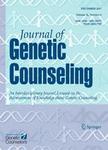版权所有:内蒙古大学图书馆 技术提供:维普资讯• 智图
内蒙古自治区呼和浩特市赛罕区大学西街235号 邮编: 010021

作者机构:Department of Neuropsychology Transitional Learning Center Galveston TX United States Department of Psychology Jackson State University Jackson MS United States Department of Psychology University of North Texas Denton TX United States Hereditary Cancer Risk Program Baylor-Sammons Cancer Center US Oncology Dallas TX United States Transitional Learning Center Galveston TX 77550 1528 Post Office Street United States
出 版 物:《Journal of Genetic Counseling》 (J. Genet. Couns.)
年 卷 期:2004年第13卷第2期
页 面:157-176页
学科分类:0710[理学-生物学] 0402[教育学-心理学(可授教育学、理学学位)] 04[教育学] 1002[医学-临床医学] 1001[医学-基础医学(可授医学、理学学位)]
主 题:Breast cancer Family environment Genetic testing Psychological distress
摘 要:Although there is some understanding of the shared characteristics and predictors of psychological distress of women participating in hereditary breast and ovarian cancer registries, these same characteristics are only beginning to be identified in research on community women seeking genetic testing for BRCA1/BRCA2 gene mutations. This study provides an initial exploration of characteristics associated with family environments for 51 community women waiting to receive such genetic testing results. Thirty-four of the 36 women classified on family environment type of the Family Environment Scale (FES) were from Personal Growth-Oriented families. Comparisons of women with and without personal cancer histories resulted in a trend for women with personal cancer histories to be classified as from Independence-Oriented families. Reported distress appears to vary for different family emphases based on family and personal cancer history. A moral-religious family emphasis consistently appeared to be associated with decreased psychological distress. Preliminary analyses comparing these community women (who were not part of a hereditary registry but were self- or physician-referred) seeking genetic testing with normal and distressed family means found that increased cohesion and expressiveness may be related to decreased conflict, indicative of potentially supportive family environments for these women. When compared with normative data, a subset consisting of the Ashkenazi Jewish women showed a trend of less cohesion than normal families, but similar cohesion levels as distressed families.